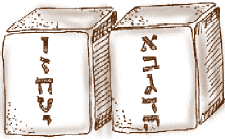The word “charity” does not exist in Hebrew. So what is it called when people give money to the needy? It is called “tzedaka.” This more literally translates to “righteousness.”
What is the difference between charity and righteousness? Charity is going above what is expected of you. It is a bonus thing you can optionally choose to do. Righteousness is a baseline. It is the right thing to do, but one that is expected of you.
Our Torah portion, Mishpatim, begins with the words “And these are the ordinances that you shall place before them.” We are following off the heels of the Revelation at Sinai and G-d giving the Ten Commandments to the Jewish people. This entire Torah portion is a list of laws and their explanations. This is THE starting point of the Jewish people as a nation, and G-d decided to start things off with a list of obligations. A series of expectations.

This is not the only way that one can start a nation. Many nations are also started with a set of documents. Sometimes in those documents, the primary feature is instead a Bill of Rights. A list, not of obligations for its people, but of rights owed to them.
In practice, if people have rights or obligations that mirror each other, the results should be the same. One man’s obligation leads to another man’s right. One man’s right leads to another man’s obligation.
Still, the difference in which is written highlights a distinction in focus. A focus on rights can lead people to be takers. While a focus on obligations should lead people to be givers.
The Torah’s verses are replete with the idea that a man is responsible for himself and his own actions. It is similarly filled with reminders that he is also responsible for the well being of those around him. He must be careful with his fellows belongings, go out of his way for the orphan and widow, lend to those in need, not leave damaging objects in the public thoroughfare, guard his animals so they do not harm others, etc.
Our Torah portion makes clear with every paragraph that a man is not an island. He is part of a wider people and he is obligated to make that people better by his presence. He must give. And by doing so, he can become a giver.
Good Shabbos,
Rabbi Altonaga and the JET Team

